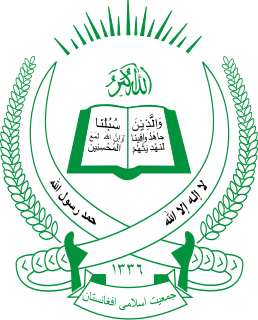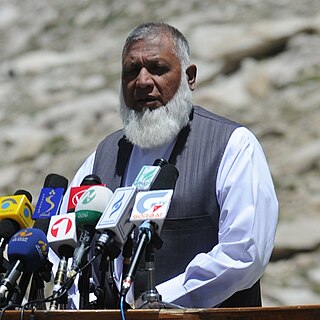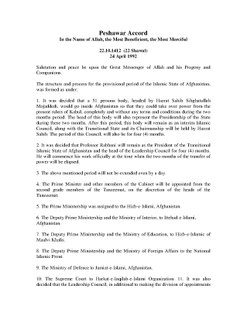Related Research Articles

Gulbuddin Hekmatyar is an Afghan politician, former mujahideen leader and drug trafficker. He is the founder and current leader of the Hezb-e-Islami Gulbuddin political party, so called after Mohammad Yunus Khalis split from Hezbi Islami in 1979 to found Hezb-i Islami Khalis. He has twice served as Prime Minister during the 1990s.
After the Taliban took charge in Kabul, Afghanistan in 1994, Commander Kashmir Khan opposed the Taliban regime and fought several battles with the Taliban. Kashmir Khan belonged to the Shura Nizami of Hezb-e Islami. Human Rights Watch, quoting the Afghan Support Project, reports that the Hezb-e Islami attacked Kabul through regular rocket bombardment, causing extensive civilian casualties, and damage to property.

The Islamic State of Afghanistan was the government of Afghanistan, established by the Peshawar Accords on 26 April 1992 by many, but not all, Afghan mujahideen parties, after the fall of the communist government. Its power was limited due to civil war. When the Taliban took power of Kabul along with most of the country at large in 1996, the Islamic State transitioned to a rump state that became known as the Northern Alliance and continued to fight against the partially recognized Islamic Emirate of Afghanistan. In the aftermath of the 2001 United States-led invasion of Afghanistan and victory by the Northern Alliance, the Islamic State briefly regained control of the country. In 2002, it was formally succeeded by the Transitional Islamic State of Afghanistan.

Hezb-e-Islami, lit. Islamic Party, was an Islamist organization that was commonly known for fighting the Communist Government of Afghanistan and their close ally the Soviet Union. Founded and led by Gulbuddin Hekmatyar, it was established in Afghanistan in 1975.

The Islamic Dawah Organization of Afghanistan is a political party in Afghanistan led by Abdul Rasul Sayyaf. Founded in the early 1980s as the Islamic Union for the Liberation of Afghanistan, it was originally an attempt to bring unity amongst Islamist opposition forces in Afghanistan. However, the creation of the new umbrella organization effectively created a split and the organization became a political party of its own. The organization was part of the 'Peshawar Seven', the coalition of mujahedin forces supported by the United States, Pakistan and various Arab states of the Persian Gulf in the war against the PDPA government, Soviet forces and Ba'athist Iraq. Through the financial aid received from Saudi sources, the organization was able to attract a considerable military following. Arab volunteers fought in the militia forces of the organisation.

Hezb-e Islami Khalis is an Afghan political ex-Mujahidin movement under Maulawi Khalis, who separated from Gulbuddin Hekmatyar's Hezb-e Islami and formed his own resistance group in 1979. The two parties were distinguished as Hezb-e Islami Gulbuddin and Hezb-e Islami Khalis, after the names of their respective leaders.

Jamayat-E-Islami, sometimes shortened to Jamiat, is a predominantly Tajik political party in Afghanistan. It was originally formed as a student political society at Kabul University. It has a communitarian ideology based on Islamic law. During the Soviet–Afghan War and the following Afghan Civil War against the communist government, Jamiat-e Islami was one of the most powerful of the Afghan mujahideen groups. Burhanuddin Rabbani led the party from 1968 to 2011, and served as President of the Islamic State of Afghanistan from 1992 to 2001, on exile from 1996.

Mawlawi Mohammad Yunus Khalis was a mujahideen commander in Afghanistan during the Soviet–Afghan War. His party was called Hezb-i-Islami, the same as Gulbuddin Hekmatyar's party. The two are commonly differentiated as Hezb-e Islami Khalis and Hezb-e-Islami Gulbuddin.

The Hezb-e-Islami Gulbuddin, also referred to as Hezb-e-Islami or Hezb-i-Islami Afghanistan (HIA), is an Afghan political party and former militia, originally founded in 1976 as Hezb-e-Islami and led by Gulbuddin Hekmatyar. In 1979, Mulavi Younas Khalis split with Hekmatyar and established his own group, which became known as Hezb-i Islami Khalis; the remaining part of Hezb-e Islami, still headed by Hekmatyar, became known as Hezb-e Islami Gulbuddin. Hezbi Islami seeks to emulate the Muslim Brotherhood and to replace the various tribal factions of Afghanistan with one unified Islamic state. This puts them at odds with the more tribe-oriented Taliban.

The 1989–1992 Afghan Civil War took place between the Soviet withdrawal from Afghanistan on 15 February 1989 until 27 April 1992, the day after the proclamation of the Peshawar Accords proclaiming a new interim Afghan government which was supposed to start serving on 28 April 1992.

The 1992–1996 Afghan Civil War took place between 28 April 1992—the date a new interim Afghan government was supposed to replace the Republic of Afghanistan of President Mohammad Najibullah—and the Taliban's conquest of Kabul establishing the Islamic Emirate of Afghanistan on 27 September 1996.
The Afshar Operation was a military operation in Afghanistan that took place on February 11–12, 1993 during the Afghan Civil War (1992-96). The operation was launched by Ahmad Shah Massoud and Burhanuddin Rabbani's Islamic State of Afghanistan government and the allied Abdul Rasul Sayyaf's Ittehad-i Islami paramilitary forces against Gulbuddin Hekmatyar's Hezbe Islami and Abdul Ali Mazari's Hezbe Wahdat militias in the densely populated Afshar district in west Kabul. The Hazara-Hezbe Wahdat together with the Pashtun-Hezbe Islami of Hekmatyar had been shelling densely populated areas in northern Kabul from their positions in Afshar, killing thousands. To counter the shelling, government forces attacked Afshar in order to capture the positions of Wahdat and its leader Mazari, and to consolidate parts of the city controlled by the government.

The Battle of Kabul was a series of intermittent battles and sieges over the city of Kabul during the period of 1992–1996.
The Shamshato refugee camp is a large refugee camp 25 kilometers southeast of Peshawar, Pakistan. Peshawar lies just east of Pakistan's Federally Administered Tribal Areas, which line Pakistan's border with Afghanistan.

Hezb-e Wahdat-e Islami Afghanistan, shortened to Hezbe Wahdat, is an Afghan political party founded in 1989. Like most contemporary major political parties in Afghanistan, Hezb-e Wahdat is rooted in the turbulent period of the anti-Soviet resistance movements in Afghanistan in the 1980s. It was formed to bring together nine separate and mostly inimical military and ideological groups into a single entity.

Munshi Abdul Majid is an Afghan politician. He is an ethnic Pashtun from Baghlan Province. In the 1990s he served as an official in the Afghan Interior Ministry; he is also known as a writer and orator in Persian and Pashto.
Hizb-i Islami Afghanistan is a title claimed at various point by several Afghan political and militant groups. The groups are commonly referred to by the name of their leader, though the group itself may claim the term "Afghanistan."

On 24 April 1992, the Peshawar Accord was announced by several but not all Afghan mujahideen parties: Gulbuddin Hekmatyar, leader of Hezb-e Islami, had since March 1992 opposed these attempts at a coalition government.
Mohammad Amin Karim is a Senior Political Board Member of Afghanistan's Hezb-e Islami Party under the leadership of Gulbuddin Hekmatyar.